
Warring Fronts RPG Forum
Warring Fronts is a medieval fantasy nation RPG forum.
|
| | | Creating a Kingdom |  |
| | | Author | Message |
|---|
Mille Sessau
Admin
Posts : 567
Join date : 2011-02-18
 |  Subject: Creating a Kingdom Subject: Creating a Kingdom  Fri Feb 18, 2011 11:43 am Fri Feb 18, 2011 11:43 am | |
| Warring Fronts This is a dark age, a bloody age, an age of daemons and of sorcery. It is an age of battle and death, and of the world's ending. Amidst all of the fire, flame and fury it is a time, too, of mighty heroes, of bold deeds and great courage. At the heart of the Old World sprawls the Empire of Ezria, the largest and most powerful of the civilized realms. Known for its militaristic views and cutthroat winged infantry, it is a land of great mountains, mighty rivers, ancient gulleys and vast cities. And from his throne in Coronne reigns the Emperor Casimir I, sacred descendant of the founders of the original Avian city-states. But these are far from civilised times. Across the length and breadth of the Old World, from the knightly palaces of Mille Sessau to ice-bound Shidrus in the far south, come rumblings of war. In the towering Eastern Mountains, the Orc and Elven tribes under the flag of the Confederacy are gathering for another assault. The steppe people of the far north ride across the great plains, unhindered by any other army on the continent. There are rumours of stirrings in the Dwarven mountain kingdoms, the Hold of Karag Mor and the Republic of Ever-Winter. And from the west in the Great Desert, the Merenaz Caliphate readies for war against nearby expansionist powers. As the time of battle draws ever near, the worlds needs heroes like never before. This is Warring Fronts. 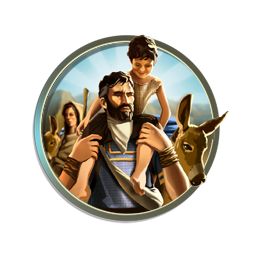 Race RaceThe kingdoms race, as of right now, is to choose what 100% of the kingdoms population will be made up of. This may change later as the meta game evolves, but as of now all kingdoms start out as a single race (Confederacy type of government has allowed for this to change). The first choice here is to choose a race, all races have their own individual pros and cons, so choose wisely. | Races | | Name | Description | Life Span | Bonus | Malus | | Humans | Humans are the youngest race around, and they have the most to learn. However, humans are also the most eager to learn the ancient art of magic, and they are also one of the more honorable races. Human kingdoms are varied and diverse, which leads credence to the idea that humans are a powerful race indeed. | 70 Years | Strength of Men - Humans have increased fighting prowess against non-Human races.
Natural Diplomats - All Trade Agreements generate +1 Economic Point per Resource being traded to another kingdom. | Easily Corrupted - Human leaders are easily corrupted or bribed.
Disunity - Increases chance of Heretics and civil wars occurring. | | Dwarves | Dwarves are one of the ancient races on the planet. They are a stockier race, standing at about four and a half feet tall. It's common in their culture to have long beards and usually, while history has indicated that most of their recorded empires have been built underground, some surface dwelling dwarven cultures have been observed. The Dwarves have a natural pennant for mining and casting, but what is the most known facet of them is their stubborn politics. | 450 Years | Underground Empires - Dwarven Kingdoms must be built Underground.
Dwarven Metallurgy - All initial Dwarven cities and later built cities start with a single Forge in them. | Stubborn - Dwarves have lowered diplomacy with kingdoms that they have a bad or shaky history with.
Unable Riders - Dwarves cannot purchase Light Cavalry or Heavy Cavalry.
| | Elves | Arguably the oldest race on the planet, Elves have watched the world grow and watched the world burn. Magically powerful and cunning, the Elves are a tall and elegant race, known particularly for their pointed ears and patient nature. The Elves are traditionally a race aligned more so with the morality of law and justice, but history has indicated that races of Dark Elves have made themselves known before. | 6,000 Years | Old Kingdoms - Elven Kingdoms start with a Construct of choice in the capital.
Silvan - Wood Resource Nodes start with a 30 unit limit, instead of 20, but cannot build Lumber Mills.
| Deliberative - Elves are very slow to decide on all political and military matters.
Ancient Peoples - Elves Population Growth is decreased by 800. | | Halflings | Halflings are older than Humans but younger than Dwarves and Elves. They are shorter than Dwarves but have a look more Human. They are known mostly for their humor and large, hairy feet over anything else. They are not particularly fond of warfare and prefer trading and bartering. They are often characterized by curly hair and big smiles. | 250 Years | Stable Culture - Halfling Kingdoms start out with a base of 3 Cultural Points a week.
Farmers of the Land - Foodstuff Resource Nodes generate +2 Economic Points a week. | Frail - Halflings have decreased efficiency in battle.
Poor Craftsman - Iron and Mithril Resource Nodes have a maximum unit cap of 10. | | Orcs | Called greenskins by the more civilized races, orcs are lumbering warriors that know no equal. They are less intelligent than other races, but they are savage and shamanistic and it is easy for Orc Kingdoms to slip into war without much trouble. The Orcs have a disdain for most other races but have been known to trade and wage war alongside the Goblins and Lizardmen from time to time. | 70 Years | Savage - Orcs receive 2 Military Points per 1,000 citizens a week.
Call of the Wild - Orcs can create and hire mercenaries with the available races Goblin, Mountain Troll and Lizardmen. | Nomadic - Orc cities can not have more than four constructs in them.
Natural Barbarians - Orcs have a baseline of -3 Happiness per city per week. | | Goblins | Standing about as tall as halflings, Goblins are grey skinned humanoids that are characterized by their high pitched voices and pointed ears. They are naturally frail but fierce fighters, and they can be cunning in warfare. History has shown them to be an aggressive race but good natured goblins are not an impossibility in the world. | 45 Years | Mountain Prone - Goblin Kingdoms may be built Underground or Above Ground. One must be chosen.
Expansive Growth - Goblins have an increased +1,300 Population Growth. | Weak Willed - Goblins may route or retreat if their leaders are killed during battle.
Unable Riders - Goblins cannot purchase native Heavy Cavalry. | | Avians | Avians stand six and a half feet tall with a humanoid frame and distinct avian features. They have talons for appendages, a beak instead of a human orifice and nose, and a huge set of feathered wings. They hatch eggs instead of live births. Their own race has its legends set in stone with the Lizardmen. Most Avian Kingdoms have a founding within huge mountain resorts rather than across the plains. | 180 Years | Flight - Avian Warriors and Skirmishers may take short range flight during maneuvers, but not during combat.
High Culture - All Luxury Resource Nodes generate +1 Culture a week. | Arrogant - Avian Kingdoms have decreased diplomacy with all other kingdoms.
Xenocentric - Avian Kingdoms must pay double for non-Avian mercenary units. | | Lizardmen | Rumored to be as old as the Elves, the Lizardmen are bipedal, reptilian humanoids that have clawed appendages, beady eyes and elongated snouts with a vicious row of teeth. They hatch eggs instead of live young. The Lizardmen as cold-blooded creatures are much more receptive to the environment than the warm blooded races. | 180 Years | Cunning - Lizardmen Kingdoms start with the trait Military Tactics and may pick one of the following sub-traits. This trait is free, they can still pick whatever other military trait they want.
Simple People - Lizardmen kingdoms have +1 Happiness points per city per week. | Isolationist -Minor Border Expansion and Major Border Expansion cost twice as many Cultural Points.
Keepers of the Wild - Lizardmen cannot build Forge or Armory Constructs. | | Drow | Drow are fundamentally the same as elves but are noted as a distinct sub-species. Drow have obsidian colored skin and pale yellow (or pale golden), silver or white hair, the latter being by far the most common. This hair is carefully groomed and cared for by most drow and worn long with jewelry and other accessories decorating it. Like all elves, drow are incapable of growing beards, though many males are fond of long sideburns. Drow have an ancestral rivalry with High Elves but have been known to ally with Dark Elves in the past. Drow stand between 5 and 6 feet tall but never much tall. | 600 Years | Underground Empires - Drow Kingdoms must be built Underground.
Swords for Hire - Drow can hire 1 Mercenary Company a week for free. | Infighting - Civil wars and assassinations have a higher chance of occuring.
Surface Uncertainty - Drow have decreased fighting prowess while fighting on the surface. | |
Last edited by Mille Sessau on Wed Apr 13, 2011 10:16 pm; edited 53 times in total | |
|   | | Mille Sessau
Admin
Posts : 567
Join date : 2011-02-18
 |  Subject: Re: Creating a Kingdom Subject: Re: Creating a Kingdom  Fri Feb 18, 2011 11:48 am Fri Feb 18, 2011 11:48 am | |
| 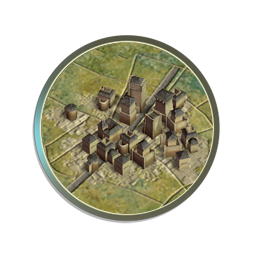 Kingdom Size Kingdom SizeThe size of a kingdom is important in Warring Fronts, as is the location. There are two types of planes for kingdoms, Above Ground and Underground. Only Dwarves, Drow and Goblins may build their kingdoms underground, and if they are built underground do not have to honor any above ground borders as they will not physically be on the same plane as each other. When you are creating your kingdom, you must choose your kingdoms size. Below are the various sizes. Minute - A minute kingdom is the barest of kingdoms. Besides the central capital city and a small plume of land surrounding it composing villages, windmills, et cetera, there's very little else to the kingdom. The kingdom has either lost land due to war, or just never expanded past the borders of its capital. * Has only one city, the Capital. Small - A small kingdom has expanded past its capital and established a secondary village. There is a designated path between the capital and the city, but the road may not have been laid and cartographed. There is sufficient space for farming and the like between the city and capital for further expansion as well. * Has one city and the Capital. Moderate - A moderate kingdom possesses a capital and two cities, as well as having adequate land surrounding all three settlements for sufficient growth. A moderate sized kingdom is ripe both for growth as well as conquest. * Has two cities and the Capital. Massive - A massive kingdom has large swathes of land and four secondary cities along with the capital. The largest problem with a massive sized kingdom is that it becomes exceedingly difficult to defend its large borders. * Has four cities and the Capital.  Government GovernmentWhat kind of government your kingdom has is very important, this will also be a factor in how other kingdoms and races see you as well as award bonuses or rewards. Government changes can occur through RP, either at the players expense or at the hands of the Moderator. Below are the types of available governments. Government CivicGovernments
- Monarchy - Monarchy is a form of government where power is vested in an individual. Often, but not always, power passes to the monarch's heir upon the current ruler's death. (There are some elected monarchies, but not many.) Monarchy is similar to despotism, but with one important difference: the monarch rules within the state's laws, while a despot is above all law. It is of course quite possible for a monarch to be a despot - but it is also possible for a monarch to be part of a political process which allows the people a good deal of freedom.
-- Theaters built in the capital generate +2 more Cultural Points.
- Oligarchy - Oligarchy is a form of government in which a small segment of society has all of the power. Power might be held by a specific family or tribe, or people of a certain religion or from a special caste. Usually the rich or militaristically imbued are the ones with the power. Some oligarchies can be good in nature, though this is rare.
-- Military Units fighting in Home territory fight as Veteran -- High Morale.
- Despotism - A true dictatorship, there is one leader and he or she has taken full power and there is nothing the population can do about it. The people are treated according to their whim, whether good or bad. However, their presence is not preferred by the people and they make it known often.
-- Every 5 Military Units purchased gives 1 new Military Unit for free.
- Confederacy - A confederacy is a patchwork of states coming together under a shared banner for a single purpose. They have each decided to support eachother financially, militarily and politically to consolidate their power. A confederacy is power in ways of unity and offering multiple views, but it is weak in that disagreements are often common, and full unanimity is required in all decision making.
-- Starts with a Marketplace and a Shrine in the capital city.
- Republic - A republic is a form of government in which people or the representatives of the people have ultimate power rather than the power being vested in a monarch or despot. The people or their representatives may elect a leader, but that leader's power derives from the consent of the people.
-- Generates +1 Happiness per city per week.
Last edited by Mille Sessau on Mon Apr 11, 2011 10:13 am; edited 26 times in total | |
|   | | Mille Sessau
Admin
Posts : 567
Join date : 2011-02-18
 |  Subject: Re: Creating a Kingdom Subject: Re: Creating a Kingdom  Fri Feb 18, 2011 11:49 am Fri Feb 18, 2011 11:49 am | |
| 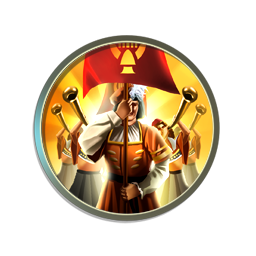 Population PopulationPopulation indicates the number of people living in a kingdom. It is unrelated to kingdom size; a small kingdom can be packed to the brim, while a large one can be thinly spread. Population determines two things: how many Military Points a kingdom gets, and its rate of population growth. Large populations will have slower population growth, while smaller kingdoms will have faster population growth. You can start with a population anywhere between 20,000 and 125,000, but numbers beyond 125,000 can only be achieved through population growth. Likewise, populations under 20,000 can only be achieved through massive casualties. Population growth reflects both the birthrate and the rate of maturation, so in a given time period a thousand citizens may be born, and a thousand will also come of age. Populations between 20,000 and 60,000 have a High birthrate :- Increase of 2,000 a week. Populations between 60,000 and 95,000 have a Modest birthrate :- Increase of 1,200 a week. Populations between 95,000 and 125,000 have a low birthrate : - Increase of 700 a week. Populations under 20,000 will still receive 2,000 per week, while populations over 125,000 will maintain 700 a week per week. Population GrowthYour population is recounted every week like this: Old Population + Population Growth = New Population So if the original population is 45,000, then it would look like this: 45,000 + 2,000 = 48,000 The empire's new population would be 48,000. Every week when these increases are calculated you will receive a Private Message telling you your new population, as well as the number of military personnel available for assignment. Kingdom Heroes Every kingdom will be allowed a maximum of 3 Heroes at any one time. All Kingdom's start with 1 Hero, their leader. So you get 1 free Hero and you'll have to get your 2 other Heroes down the road. Every Hero is allowed 2 traits and they are randomly given 1 malus, which is something bad. Here are the traits and malus. Traits- Charismatic -
-- Generates +2 Happiness Point per week.
- Industrious -
-- Non-Military Construct Prices are decreased by -3 points.
- Expansive -
-- Minor Border Expansion and Major Border Expansion cost -3 Cultural Points.
- Creative -
-- Generates +2 Cultural Points a week.
- Financial -
-- Generates +2 Economic Points a week.
- Organized -
-- 10% of Military Maintenance costs are waived.
- Aggressive -
-- Increased Morale when leading army.
- Imperialistic -
-- +400 Population Growth a week.
- Negotiator -
-- All Mercenary Unit prices are decreased by -1 Economic Point.
- Protective -
-- Minor Wooden Walls, Minor Stone Walls, Defensive Outpost and Fortress prices are decreased by 20%.
- Philosophical -
-- Libraries and Courthouses generate +1 Cultural Points.
- Spiritual -
-- Minor Temples and Temples generate +1 Happiness Points per week.
- Warrior -
-- Increases individual prowess in battle.
- Commander
-- Two of the following may be chosen: Cavalry Commander, Infantry Commander, Siege Attacker, Nightfighter, Admiral, Logistics Wizard or Strategist. The selected trait will increase their abilities in that area.
- Diplomat -
-- All trade deals generate +1 Economic Point for the kingdom.
- Pious -
-- Missionaries convert 3% more when used.
Malus- Drunkard -
-- Increases the chance of the Hero being unavailable at crucial times.
-- Decreases Cultural Points by -1 per week.
- Lazy -
-- Decreases Economic Points by -2 per week.
- Pacifist -
-- Decreases Military Points by -5 per week.
- Unpopular -
-- Decreases Happiness Points -1 per week.
- Coward -
-- Increases chance of retreating during battle or if battle is near.
-- Instant -10 Happiness if a retreat is taken.
- Incompetent -
-- Decreases Morale when commanding army.
- Gambler -
-- Increases chance of the hero gambling.
-- If hero gambles, instant loss of 5% of the kingdom's treasury.
- Ignorant
-- Increases chance of the Hero being randomly killed.
- Turncoat
-- Increases chance of the Hero defecting to another faction.
- Heretic -
-- Decreases effects of Minor Temples and Temples by 2%
- Narcissist -
-- Decreases Cultural Points by -2 per week.
- Cutthroat -
-- 1 Military Unit is randomly disbanded or destroyed every few weeks.
- Corrupt -
-- Hero randomly takes 10% of the kingdom's treasury.
- Landlubber -
-- Hero refuses to get onto a ship of any kind.
- Arrogant
-- Decreases diplomacy with neighboring kingdoms.
Example HeroCount Anju of Mille SessauIndustrious - -- Construct Prices are decreased by -3 points. Charismatic - -- Generates +2 Happiness Point per week. Incompetent - -- Decreases Morale when commanding army. Expanding In Warring Fronts, there are three ways to expand. Conquest, Colonies and Culture. Conquest - The most simple way to expand. Take what you want. If you invade a neighboring territory and take it, you must hold it for a small amount of time before it becomes yours. Once it becomes yours, the population and captured resources are added to yours and you reap all the benefits! Conquering other civilizations give HUGE Happiness maluses however. * Whenever you conquer an enemy territory that includes a city (allowing you to recruit native military units), or a resource node (giving you new resources), you have to get their Happiness level up to 60 before you can do either.
* Whenever a new land is conquered, Happiness automatically drops to 30 with a decrease of -3 not barring traits or certain maneuvers such as military presence, cultural activities and economic spending.* Conquered lands have their own Happiness rating. Colonies - Colonies can be established by any kingdom, kingdoms with the National Trait Colonialism will find it much easier to maintain and establish colonies. Colonies are small establishments usually settled on islands or other continents to help expand the kingdoms. They are difficult to maintain as they cost money and protection. Colonies may revolt if not treated appropriately. To establish a colony, this is required. * At least 2,000 citizens must be willing to go and establish a colony. * 5 Economic Points must be spent to fund the expedition for a SMALL territorial colony. * 8 Economic Points must be spent to fund the expedition for a MODERATE territorial colony. * 12 Economic Points must be spent to fund the expedition for a LARGE territorial colony. * 20 Economic Points must be spent to fund the expedition for a MASSIVE territorial colony. * Colonies require a payment of 1 Economic Points per 1,000 citizens to maintain. * Underground kingdoms can establish colonies above ground. Culture - To expand your borders you must spend Cultural points. Please see the Cultural Activities for further information.
Last edited by Mille Sessau on Sun Apr 10, 2011 11:11 pm; edited 19 times in total | |
|   | | Mille Sessau
Admin
Posts : 567
Join date : 2011-02-18
 |  Subject: Re: Creating a Kingdom Subject: Re: Creating a Kingdom  Fri Feb 18, 2011 11:49 am Fri Feb 18, 2011 11:49 am | |
| Kingdom Traits Kingdom Traits are what will genuinely make your kingdom unique amongst other kingdoms. There are five categories, and it is required to pick one trait from every category. These traits will give fluff bonuses as well as tangible bonuses, but almost all traits have a backdrop as well. Some races cannot pick certain traits, so be mindful of that. Labor Civic- Tribalism - Tribalism is a nomadic way of lifestyle where constructs are built as needed and the people generally do not build things they do not need. A tribal society is known for it's simplicity and how easily things come together. However, during times of crisis many tribesmen do not know what to do as a complex political system is not in place to delegate who is to do what and where to go where. Tribalism however is free from payment, free from loans and debts, free from corruption.
-- Population Increase of +1,500 per week.
-- Maximum of 2 Constructs per city can be built within the kingdom.
- Serfdom - Serfdom is the enforced labor of serfs on the fields of landowners, in return for protection and the right to work on their leased fields. A kingdom with serfdom always has a viable work force, but they are not always happy. If you need something built, you'll always have a large supply of workers. They own only the clothes on their back and for working on their lords fields they are given food and shelter. Civil unrest is common in serfdoms, but someone not working is very uncommon.
-- Irrigation Farmlands generate +2 more Economic Points per week.
-- Lumber Mills generate +2 more Economic Points per week.
- Slavery - The kingdom has legally funded the institute of slavery within its borders. Slaves can be of the same race of the kingdom, or another race. Slavery allows for the freemen of the kingdom to work and if they need to, fight. This has allowed for increased economic growth as well as possible military growth during wartime. However, other kingdoms that don't condone slavery look down upon this kingdom for its barbaric institutes.
-- All Constructs have their prices decreased by 30% (rounded up).
-- Decreases Happiness by -3 Points per city per week.
- Caste System - The caste policy is an elaborate and complex social system that combines elements of occupation, endogamy, culture, social class, tribal affiliation and political power. It should not be confused with more elemental aspects such as nobility, race or social class, in that members of all castes in one society may belong to the same race. The caste system divides the kingdom up among it's different castes, and while sometimes can be a positive enforcement, is mostly negative. There are usually the worker, warrior and often times leader or noble castes. These castes create social conflict and can sometimes lead to political or military incidents.
-- Forges, Plantations, Textile Milles, Marketplaces, Theaters and Quarries all generate +1 more Economic Points per week.
- Trade Guilds - Trade guilds are organizations of workers who have banded together to gain better working conditions, increased salaries and so forth for their members. The trade guilds negotiates contracts with the employer, hopefully achieving more success than any individual employee could on his or her own. If the negotiations are unsuccessful then the trade guild might organize a work stoppage (or "strike"), limiting or curtailing the employer's income. Many kingdoms have bitterly resisted the creation of guilds and more than a little blood has been shed over the matter.
-- Allows the kingdom to build Guild Halls.
-- All cities in the kingdom start with a Guild Hall.
- Free Workers - Workers in the kingdom can work with whom they please. Some wish to be masons, some wish to be scribes and others wish to join the military. There is no hierarchy that dictates who is born into what. Farmers becoming kings is still a near impossibility, but only in a society where workers are free to work where they wish is it possible that innovative new ideas can be added, traded and viewed to become usable, rather than in a heavily protected society where artists trudge stone and masons fight in the king's army.
-- Requires only 30 Economic Points for a Golden Age requirement.
-- Capital starts with a Library Construct and all other Library Constructs cost 6 Economic Points less.
Legal Civics- Iron Rule - In the sense of a legal system, one ruler, or multiple rulers have absolute law. What they will is the first and last sense of justice the kingdom can expect. Iron rule can occur in every type of government except a Republic. Even in a Monarchy, where a king usually rules with some degree of benevolence, he can become a tyrannical leader by usurping legal documents and commanding as he wishes, what can the people do besides be oppressed and shun by his or her will?
-- Allows the existence of an Elite Guard unit. 5 Military Units of any type. If they are ever defeated they can be brought back for 5 MP a unit and they must all be the same units.
-- Decreases Happiness by 1 per city per week.
- Vassalage - Under vassalage, the power and prestige in a nation is held by those who own the land. The more land one owns, the more powerful one is. In some cases land ownership may be limited to members of a certain class, tribe, religion, or even gender. Great care must be taken by the elite to see to it that the great unwashed mass of peasants don't become angry with them, as such situations often end with a radical redistribution of land, which may or may not be accompanied by the executions of the former landowners.
-- Generates +1 Cultural Points per city per week.
-- Once a week, every city in the kingdom grants a free military unit.
- Rule of Law - The government is bound by certain laws or traditions to respect the rights and privileges of its citizens. Respecting these traditions makes for a happier populace and less corruption, but also makes it more difficult to crack down on unrest or criminals.
-- Increases Happiness by 1 per city per week.
-- Courthouses & Town Watches cost 50% less.
- Citizenship - Citizenship is the policy of a nation that acknowledges that a certain group of people, usually based upon their race or tribe or where they were born, are members of that nation, and as such, deserve a certain amount of protection as well as some rights and privileges, above and beyond those accorded to foreigners. For example, a citizen can often move around the country freely, while a non-citizen may be subject to deportation or imprisonment if discovered by the authorities.
-- Requires only 75% of maximum Happiness for a Golden Age requirement.
-- Marketplaces generate +1 Economic Points per week.
- Taxation - The kingdom has decided that it can vary the level of taxation upon its citizens. The economy can flux and the taxation rate can be adjusted to ensure the people are kept happy. When the taxation rate increases, the revenue of the kingdom increases but the unrest within the kingdom increases as people make less and less for themselves.
-- Taxation Rate: Anywhere from 0 to 10.
-- For every level of taxation past 7, a decrease of 2 Happiness points a week occurs.
-- For every level of taxation of 6 or below, an increase of 2 Happiness point a week occurs.
- Social Freedoms - As a trait, freedom generally means that no class of society is subservient to another, and that all are equally subject to the laws. I can't own you, and you can't take my wife from me simply because you're the king's son-in-law. Free societies are generally more successful than non-free states, as the free people often feel that they have more of a stake in their country's success or failure.
-- +1 Happiness per Luxury Resource in the kingdom or entering the kingdom per week.
-- Increases population growth by 800.
Religion Civic- Paganism - The people don't have any true to heart beliefs. These people may belief this, those people may believe that, but the society of this kingdom isn't run on the worship of a deity, it's social and military policies are not dictated by holy books, and its cuisine is not limited to only clean and approved animals. Although called paganism, the trait is exemplified more by a lack of general or set beliefs, rather than the wrong belief.
-- Missionary units become Heretics that decrease Religion by a selected amount in cities instead of increasing them.
-- If enough Paganism is spread into kingdoms with Local Beliefs and Organized Religion, religious sects will break off and cause strife in those kingdoms.
- Moral Philosophy - A moral philosophy is a code of conduct and moralization that takes the place of religion. Rather than worshiping a deity (or deities), followers of a philosophy attempt to refine their lives in order to achieve a more perfect state. These philosophies often emphasize duty and obligation to the state as well as personal refinement.
-- The philosophy must have a particular mandate: Pacifism (+2 Happiness per city when not at war), Hedonism (+1 Culture per Luxury Resource), Education (+1 Economic Point per city), or Warrior Code (Increased prowess in combat).
-- Missionary units become Teachers that can spread the philosophy and decrease surrounding religions.
- Local Beliefs - Local Beliefs are ancient and old religions, whether polytheistic or monotheistic that have stood the test of time and been passed down through the ages, most likely through storytelling and in some rare cases with scripture. Minor Religions have the added boost that people can accept a Minor Religion much easier than a Major Religion which might have a huge pantheon of Gods and hundreds of new rituals to learn. People can take on local beliefs without having to change the greater things in life.
-- Kingdom will have a Minor Religion that starts at 35% of the kingdoms population. Your kingdom's capital will be that Minor Religion's capital.
-- +2 Happiness Points for every Natural Resource Node your kingdom possesses.
- Organized Religion - Organized religion is one in which a number of people follow the same religious practices and have the same beliefs. The religion may have priests who intercede with higher powers on behalf of the believers or who set/interpret the religion's rules. There may be a complicated hierarchy of priests and other religious leaders. The religion may have temples or other sanctums in which the people pray and worship. Generally the believers contribute money to support the religion, its priests and buildings. Generally, organized religion is a force of stability within a culture. People who share a religion have something important in common, and although strangers are less likely to murder each other. It can also be quite divisive as well - historically many organized religions have seen other religions as threats or abominations, and more than one war has been fought over whose god is the real God.
-- Kingdom will have a Major Religion that starts at 70% of the kingdoms population. Your kingdom's capital will be that Major Religion's capital.
-- Missionaries cost 50% less.
- Free Beliefs - Free religion is the policy of a state which does not mandate which religions its members must adhere to. All religions are welcome, and let the spiritual marketplace decide among them. Though perhaps implemented for more noble reasons, free religion often has the effect of limiting the power of any individual religion. In states with one religion, the people in charge of that religion may wield a great deal of power. States with free religion generally attempt to treat them all equally, ensuring that none can become ultimately dominant.
-- Kingdom gains +1 Cultural Points a week for every Minor Religion and +2 Cultural Points a week for every Major Religion that has at least 20% followers in it's kingdom.
-- Religion does not effect Happiness in the kingdom unless 90% of the kingdom is one religion, than -5 Happiness per week.
Military Civic- Espionage Network - The Espionage Network gives a Kingdom superior clandestine abilities by formalizing a system of spies, contacts, operatives, and organizers. With specialized training and a complex system, the network's operatives can outperform mere hired thugs or prying ears. In addition, Espionage Networks study ways to extract information from prisoners, and also train their own members and politicians in resisting these methods.
-- Subjects of kingdoms with Espionage Network are more resistant to interrogation.
-- Espionage Activities may now be carried out. Their success is determined by how much Economic Points are spent on them.
- Advanced Training - The kingdom has given more time and training to a certain type of soldiery. It may be the Light Cavalry, used for scouting and quick flanking types, or it may be the Light Infantry have had their training and equipment bolstered so that they may go head to head with other kingdoms Heavy Infantry, but all the surrounding kingdoms understand that these well trained units are a symbol of national heritage.
-- One type of Military Unit is always considered Elite in a single category: Morale, Discipline, March.
- Conscription - In times of war, many of those serving in non-military roles are put through a hurried training, given a weapon and ordered to the front. They do not have to pay for their own weapons or training, the kingdom pays for it as the kingdom is the one who needed them there. They are fed, but as soon as the kingdom no longer needs them they will be disbanded and returned to their original form of work.
-- Warrior Companies, Swordsmen Companies and Light Cavalry can be purchased at a price of 1 Economic Point.
-- For every one Military Unit conscripted, 1 Happiness point is automatically deducted.
- Military Tactics - The kingdom has developed certain tactics that are above the norm, they give the kingdom an edge in time of war. There are a multitude of different choices but the kingdom has honed and perfected only a handful of these strategies.
* May choose two of the following:
-- Ambush - Ambush allows the kingdom to deploy a few regiments of Light Infantry in a position that will conceal them to the point of being unable to be located by enemy scouts and forces. When the time is right, they may ambush the enemy and inflict high casualties upon them.
-- Forced March - When logistics are stretched, or when the soldiery can not move fast enough, the army has been trained to fast and drop everything that's not necessary. Entire armies can cross huge swathes of land within a few days to intercept an incoming force or flank an enemy force.
-- Hire Mercenaries - When marching in either neutral or hostile territory, the kingdom has learned to look in the right places at the right time to find those who will fight for coin. The mercenaries will continue to fight for the kingdom so long as they are being paid. This trait greatly decreases the prices of all mercenary companies. Mercenaries are purchased and maintained with Economic Points, not Military Points. This decreases the price of all mercenaries. Halves the price of all Mercenary Units.
-- Scorched Earth - This trait can be used either in enemy or native lands, but the effect is same. All vegetation is destroyed, and if discovered, natural resource nodes can be temporarily destroyed. If used in enemy territory, this will substantially hamper their ability to sustain themselves, and if used in native territory, will substantially slow the enemies movement.
-- Local Militias - In times of great peril, local militia's will rise up to defend their homes. These militia's will last only three weeks and can not leave the kingdoms borders. For every 5,000 citizens a single Warrior Company will be raised to fight if an enemy army enters the kingdoms borders with the intent of waging war.
- Warrior Code - The Warrior Code is the ideology that the state requires a strong military, and that the needs of the military are paramount, trumping all other considerations. The state's army and navy are glorified, and its military officers hold a great deal of political power -perhaps all of it. Military states may be expansionist, but that is not a requirement.
--Mustering Hall constructs give 8 Military Points a week and Barracks constructs give 12 Military Points a week.
-- All Military Units cost 1 less Military Point.
- Professional Army - A professional army is a full-time military organization that remains in being even when the country is at peace. Its soldiers are paid for their services by the state and spend their time training or performing public works when not at war. The earliest armies were not professional. When war was imminent, the country's leaders would issue a call and all able-bodied men would shoulder their weapons and march off to battle. These amateur soldiers usually didn't have much training and were often expected to supply their own weapons and armor, so their quality was not very high. They tended to desert when they had to tend to their crops, so battles were scheduled for the summer. If victory wasn't achieved by harvest, the war would often be called off for a year. Professional armies form when a society has grown wealthy enough to support a large number of men who do not work the fields or perform other productive work. The soldiers are usually housed in barracks and segregated from the civilian population to minimize friction, and the state provides their food, weapons, armor, and training. They are almost always more effective than the amateurs.
-- All land Military Units cost twice as many Military Points and have double Military Maintenance costs.
-- All land Military Units now fight as "Veteran" types.
Last edited by Mille Sessau on Wed Apr 13, 2011 11:47 am; edited 125 times in total | |
|   | | Mille Sessau
Admin
Posts : 567
Join date : 2011-02-18
 |  Subject: Re: Creating a Kingdom Subject: Re: Creating a Kingdom  Fri Feb 18, 2011 11:49 am Fri Feb 18, 2011 11:49 am | |
| Military and Military PointsThe military of a kingdom is one of the triumvirates, one of the three factors that will determine whether your empire succeeds or not. By default, every race except for Orcs is awarded 1 Military Points per 1,000 citizens a week. For example. The Kingdom of Lordaeron has 26,000 citizens. Every week it will be given 26 Military Points. These Military Points can then be spent on any military unit. Military Points do not ever disappear if not spent. Here are the available units that can be purchased by Military Points. Military Units| Land Based Units | | Name | None | Iron | Mithril | Maintenance | | Warrior | 2 | N/A | N/A | 1 | | Spearman | 3 | 4 | 4 | 1 | | Swordsman | N/A | 3 | 6 | 2 | | Skirmisher | 2 | 3 | 4 | 1 | | Light Cavalry | 3 | 4 | 5 | 2 | | Heavy Cavalry | N/A | 5 | 6 | 3 | | Mage | 8 | N/A | N/A | 3 | | Spellsword | 10 | N/A | N/A | 4 | | Catapult | 1 | N/A | N/A | 1 | | Ballista | 2 | N/A | N/A | 1 |
| Water Based Units | | Name | Cost | Maintenance | | Bireme | 3 | 1 | | Trireme | 4 | 2 | | Galley | 6 | 3 | | Transport | 3 | 1 |
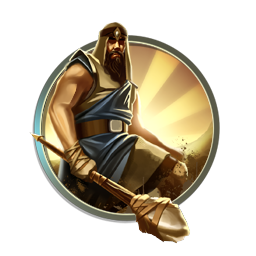 Warrior Company Warrior Company - 2 Military Points Warrior Companies are the earliest combat unit available, useful for battling barbarians, early city defense and limited exploration. Warriors are groups who have been ordered together to fight, although without any available resource for warmaking, they use stone weapons and are somewhat ineffective in combat against other units units using Iron or Mithril weapons. primitive civilizations there's no such thing as a "professional soldier." A young civilization can't afford to support a full-time army; all of the civilization's able-bodied men form an ad hoc militia, coming together during a crisis, dispersing back to their farms and villages during peace. Such warriors usually have very little training and are equipped with the most primitive of weapons - clubs, perhaps, or stone daggers. * Requires no resources.* Comprised of 300 soldiers.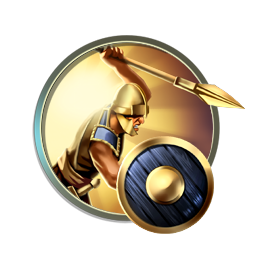 Spearman Company Spearman Company - 3 Military Points, 4 Military Points (Iron), 6 Military Points (Mithril). The earliest spears were doubtless straight pieces of wood with crudely-sharpened ends; these would quickly break or become dull with service. The spear didn't become a reliable weapon until some early innovator discovered that he could harden the tip by lightly charring it over a fire. Eventually stone tips were employed, then of course metal. Spears are fairly simple weapons to learn, and they can be produced rapidly and cheaply, so they tend to be the backbone of early civilizations' armies. When purchasing Spearman, if no Iron resource is available ; than only the tips of the spear will be iron, the spears will be wooden and their armor would be leather or hide. * Requires no resources. * Comprised of 300 soldiers. 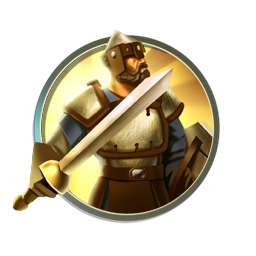 Swordsman Company Swordsman Company - 3 Military Points (Iron), 5 Military Points (Mithril). First appearing during the Bronze Age, the earliest swords were little more than extra-large daggers. It wasn't until the development of iron forging that swords became viable combat weapons. The earliest swords were short and sharp, designed primarily for stabbing. Swordsman companies employ either Bronze, Iron or Mithril in the construction of their armor and weaponry. * Requires Iron or Mithril resources.* Comprised of 300 soldiers.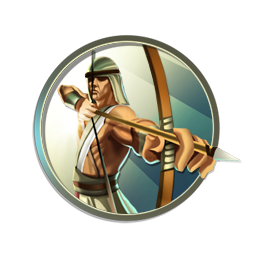 Skirmisher Company Skirmisher Company - 2 Military Points, 3 Military Points (Iron), 4 Military Points (Mithril). Skirmishers are light infantry designed primarily for ranged combat. They can be archers, peltasts, or even slingers. They have the same mobility as Light Infantry but have very minimal melee ability. They will route very quickly if engaged for a prolonged period of time in hand to hand combat. * Comprised of 300 soldiers. Light Cavalry Company Light Cavalry Company - 3 Military Points (Horse), 4 Military Points (Horse / Iron), 5 Military Points (Horse / Mithril). Light Cavalry is useful for flanking and scouting, although they have to be lightly armed and the mounts themselves are not armored to ensure they can move with great agility and maintain their endurance. Light Cavalry is more powerful as a shock force rather than one for sustained combat. * Requires Horses resource. * Comprised of 300 soldiers & mounts.  Heavy Cavalry Company Heavy Cavalry Company - 5 Military Points (Horse / Iron), 6 Military Points (Horse / Mithril). Heavy Cavalry is absolutely destructive to stationary infantry formations. The soldier and the mount are both heavily armored and although slower than Light Cavalry, they are very useful in both charges as well as sustained combat against any other kind of troop. * Requires Horses and Iron resource. * Comprised of 300 soldiers. 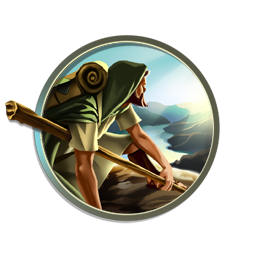 Mage Company Mage Company - 8 Points Mage Comanies are made primarily of wizards and sorcerers. They have no armor but instead are powerful offensive weapons that can wield a plethora of spells depending on their chosen school of magic. It is very important to keep them well protected, if they are dragged into combat they will almost certainly be killed. * Comprised of 150 mages. * Requires the Arcane Policy Tree. * Mage Companies have 3 Mana per battle. 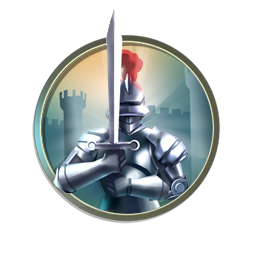 Spellsword Company Spellsword Company - 10 Points Spellsword Companies are armored mages, soldiers that use steel and bolster it with magic. Their greatest weakness is the length of training as well as the expenses to maintain their magically infused armor and weapons. They are deadly in combat, but just like all infantry are weak to extremely high enemy numbers and cavalry charges. * Comprised of 100 spellswords. * Requires the Arcane Policy Tree. * Spellswords have 1 Mana per battle. 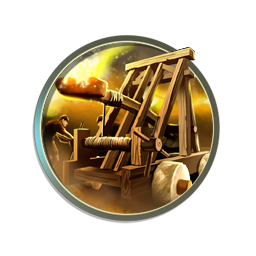 Catapult Catapult - 1 Military Point A catapult is a wooden device used to propel stones or flaming material across a huge distance. They are siege weapons but can also be used in battle, although with a bit more difficulty. They are somewhat inaccurate and one shot is fired about every five to six minutes. They are also slow to move unless well developed roads are available. They come with a small crew as well. * Requires Wood resource. Ballista - 2 Military Points The ballista is an advanced catapult that fired stones or wooden missiles at the enemy. Constructed of wood reinforced with heavy iron plates, the ballista was surprisingly accurate in the hands of trained operators. It had a maximum range of perhaps 500 yards, but its practical range was significantly shorter, especially against a fortified position. The ballista is useful against troops, whereas the catapult is useful against walls and constructs. * Requires Wood resource. Bireme - 3 Military Points The bireme is the most basic military ship a kingdom can buy. The bireme has two sets of oars on each side, hence the name. It also has a large square sail. In combat, a bireme either rams enemy ships, or attempts to board them to defeat the enemy sailors and take the vessel over. They are the fastest ship a kingdom can purchase. * Bireme's have 120 sailors. * Requires Wood resource.  Trireme Trireme - 4 Military Points Much like the bireme, trireme's are larger as they have three sets of oars on each side. They have a larger sail, and much like the bireme in combat they can either ram the enemy ships or attempt to board them to defeat the enemy sailors and take the vessel over. They are slower than bireme's. * Trireme's have 200 sailors. * Requires Wood resource. Galley - 6 Military Points Comparatively, they are huge trireme's. They have half a dozen sets of oars on each side and two huge sails. They can almost sink a bireme in a single hit, and their large compliment of sailors allows them easy pickings if they decide to attempt to board an enemy ship. However, they are very slow in combat but very fast in the crosswinds making them a double edged sword. * Galley's have 300 sailors. * Requires Wood resource. 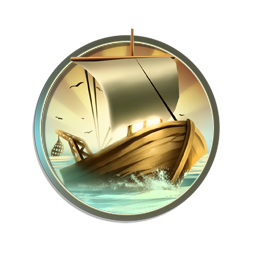 Transport Transport - 3 Military Points The transport is a simple sailing vessel designed to ferry troops to and fro ports and used for landing exercises. Transports can be beached but they require time to beach themselves as well as to unbeach themselves. They have minimal wooden armor and only a single sail which makes them the slowest vessels on the waves. * Can hold 3 Companies per ship. * Can hold 1,000 citizens. * Requires Wood resource. MaintenanceMilitary Units must be maintained otherwise they will fall into disrepair. At any time you can choose not to pay for maintenance costs which will cause the status of certain units to degrade until they are near worthless. Every week as your population grows and you are given new Military Points, before any purchases can be made you must pay Maintenance Costs. Mercenary UnitsMercenary Units can be hired in native, neutral and hostile lands. They are purchased not with Military Points, but with Economic Points. Their fighting ability varies, and their prices also vary from land to land. For example, a Mercenary Heavy Infantry Company in the Kingdom of Jurgan might be 3 Economic Points to purchase but 3 Economic Points a week to maintain, but a Mercenary Heavy Infantry Company in the Kingdom of Gorgon might be 7 Economic Points to purchase but only 1 Economic Point a week to maintain. Mercenary Ships can be purchased as well, but they also vary.
Last edited by Mille Sessau on Thu Apr 07, 2011 2:46 pm; edited 32 times in total | |
|   | | Mille Sessau
Admin
Posts : 567
Join date : 2011-02-18
 |  Subject: Re: Creating a Kingdom Subject: Re: Creating a Kingdom  Fri Feb 18, 2011 11:58 am Fri Feb 18, 2011 11:58 am | |
| Culture, Cultural Points, Happiness and AgesThe second of the triumvirate of power points within Warring Fronts. Culture is another method in which an empire can rise to greatness. If a kingdoms culture is strong enough, it will worm its way into other kingdoms and can have tangible effects for you that you will appreciate. Starting out, all kingdoms have a generation of 2 Cultural Points a week as a baseline (excluding racial bonuses, as Halflings start out with 4 a week). That means without any traits and racial bonuses, the Kingdom of Lordaeron will generate 2 Cultural Points a week. As these points are accrued, they can be spent on activities that will help expand the culture of the kingdom into other kingdoms. Cultural ActivitiesCultural Boosts are used to boost your cultural meter in a neighboring kingdom. Culture can also be used to ward off attempts to convert your people to a foreign religion!| Culture Points | | Name | Cost | Effect | | Minor Work of Art | 4 Cultural Points | +3 Happiness | | Minor Border Expansion | 8 Cultural Points | Expands kingdoms borders in a single direction | | Missionary | 8 Cultural Points | converts 5% of the target kingdom's population to a selected religion | | Establish New City | 10 Cultural Points, at least 1,000 Population | Establishes New City | | Fine Dining | 10 Cultural Points | +6 Happiness | | Minor Festival | 12 Cultural Points | +7 Happiness | | Hero | 15 Cultural Points | Allows purchase of a Hero unit. | | Mediocre Work of Art | 16 Cultural Points | +10 Happiness | | Change Social Policies | 20 Cultural Points | Change One Trait Tree (can only be used twice). | | Major Border Expansion | 22 Cultural Points | Expands kingdoms borders in one direction a moderate amount | | Native Holiday | 24 Cultural Points | +15 Happiness | | Monumental Work of Art | 28 Cultural Points | +17 Happiness | | Grand New Act | 25 Cultural Points | +30 Happiness | | Traveling Great Thinker | 35 Cultural Points | +35 Happiness |
HappinessHappiness is now the fourth addendum to the original triumvirate. We now have Military, Economics, Culture and now Happiness. Happiness is based primarily on the idea of stability in the kingdom. To keep the Happiness system simple, it has been created on a scale of having 100 Happiness per city to represent the entire kingdom. For example. City-State of Elias has two cities, Elias and Vargus. That means they have 100 x (number of cities) = 200. Elias would look like this: Elias:Happiness: 130/200. (-4) All kingdoms start with a Happiness of 65% of the standing number. Issues and events will cause great increases or decreases in happiness and Military Units, Economic Points and Cultural Points can be used to increase happiness. Happiness degrades at 2 points per city a week as a base. This differs depending on traits and government. You ask, " Another thing I have to keep up with? Why?! " Well now happiness is tangible. You have to at least care a little bit about your people, to the extent that entirely militaristic despots or hugely economic powerhouses can exist without at least moderating the happiness of the people a little bit. Happiness will not come into effect until the new Kingdom Trait System is finished. Ways to increase happiness without traits: Military-- Stationing Military Units in areas of low happiness will momentarily decrease the loss of Happiness. Economy-- Building new constructs or giving Economic Points to the population will increase Happiness. Culture-- Spending cultural points to spread positive culture will give Happiness points out. AgesHappiness is directly related to Ages. There are two ages. Dark Age and Golden Age. Here are what they are and how they're reached. Ages- Golden Age - A Golden Age denotes a period of primordial peace, harmony, stability, and prosperity. The people are flourishing, culture is extending and the civilization as a whole is extremely successful in at least three categorical regards. A Golden Age does not last however and sometimes a Golden Age is followed or predated by a Dark Age.
-- THREE of the FOUR must be met to activate a Golden Age.
-- Happiness: Overall Happiness must reach 90% of the maximum for one week.
-- Cultural: Must have at least 50 Cultural Points in the kingdom's stores.
-- Economic: Must have at least 50 Economic Points in the kingdom's coffers.
-- Military: Must have won at least five Major or Minor Victories within one war and won the war on favorable terms.
-- After THREE of these are met, a Golden Age occurs. A Golden Age has the following effects:
* Increase of +4 Happiness per city per week.
* All Constructs are 50% off, regardless of traits.
* All Units fight at Elite status, regardless of traits.
* Gold Income is increased by 50%.
* Cultural Income is increased by 50%.
- Dark Age - A dark age is a term referring to the period of cultural and economic deterioration and disruption of a certain kingdom for a certain amount of time. The kingdom is plagued by seemingly only bad luck and things seem backwards and off. A Dark Age can be triggered by fulfilling the following requirements.
-- TWO of the FOUR must be met to slip into a Dark Age.
-- Happiness: Overall Happiness drops below 45% of the maximum for one week.
-- Cultural: Have below 3 Cultural Points for two consecutive weeks.
-- Economic: Have below 5 Economic Points for two consecutive weeks.
-- Military: Must lost at least three Major Battles within one war and lost the war
-- After TWO of these are met, a Dark Age occurs. A Dark Age has the following effects:
* Decrease of -3 Happiness per city per week.
* All Constructs are 50% more expensive, regardless of traits.
* All Units fight at Weakened status, regardless of traits.
* Gold Income is decreased by 50%.
* Cultural Income is decreased by 50%.
Last edited by Mille Sessau on Sat Apr 09, 2011 3:09 pm; edited 38 times in total | |
|   | | Mille Sessau
Admin
Posts : 567
Join date : 2011-02-18
 |  Subject: Re: Creating a Kingdom Subject: Re: Creating a Kingdom  Fri Feb 18, 2011 3:37 pm Fri Feb 18, 2011 3:37 pm | |
| Resources, Economies and Economic PointsEconomies are the third portion of the triumvirate of Warring Fronts. The first iteration of Warring Fronts had resources and finances as an intangibility which made kingdoms and empires who had hoped to succeed on the power of the coin a difficult one to master. Therefore a tangible system using Economic Points and Constructs has thus been created. The system is very easy to understand as well as easy to master. There are three portions of an Economic System in Warring Fronts ; Economies, Resources and Constructs.  Resources ResourcesResources are the economic lifeblood of a kingdom. They are essential for a kingdom to thrive. Many iterations have passed and initially a player could choose what and how many resources their kingdom had, but this led to power gaming. Than a random system was put into place but it didn't work. This new system rewards the player for putting effort into their role play. The new system works like this: 1. All Kingdoms start with TWO Natural Resource Nodes. -- The first is not chosen ; it is Foodstuffs. -- The second can be chosen. 2. As kingdoms explore and are active, new resource nodes will be discovered. The first is self-explanatory, all kingdoms need foodstuffs to be able to survive. Also, this means that this resource cannot be traded unless you don't care about some of your people starving. The second resource you can choose at your own discretion, most resources have a pro. Resources | | Resource | Effect | Special Effect | | Foodstuffs | +1 Economic Point | Required. Every Additional resource node adds +400 population increase. | | Horses | +2 Economic Points | Allows 20 Cavalry per node. | | Iron Ore | +2 Economic Points | Allows 20 Military Companies per node. | | Gold | +6 Economic Points | None | | Stone | +2 Economic Points | Allows Stone Contructs | | Wood | +2 Economic Points | Allows Wood Constructs, siege equipment, and naval units. Cannot be used in underground kingdoms. | | Furs | +1 Economic Points | +4 Cultural Points | | Spices and Incenses | +6 Cultural Points | None | | Mithril | Allows purchase of 20 swordsman unit per node | None | | Aquaculture | +2 Economic Points per Transport fishing | Must have Coastline. Overfishing can lead to depletion. | | Marble | +2 Economic Points | +5 Happiness for every Stone Construct built. | | Dyes | +1 Happiness | +2 Cultural Points | | Silk | +4 Happiness | None | | Cotton | +1 Happiness per 10,000 citizens | None | | Sugar | +1 Happiness | Increases Population Growth by 400 per city per week. | | Wines | +1 Economic Points | Increases Population Growth by 600 per week. | | Note: All Economic Point, Cultural Point and Happiness Points increases are halved when traded. In the case of +1's, they continue to be generated for the original kingdom. See Trade Agreements for details. |
EconomiesAs a baseline, all Kingdoms start with an Economy of 0. That means that every week they make 0 Gold. Your starting resources however will generate resources for you, but to truly become an economic power, an economy has to grow and that is done through two different options, Trade Agreements and Resources. A Trade Agreement is a mutual agreement to trade resources between two kingdoms. Here are the rules for trading Trading AgreementsAny kingdom with a resource may trade it to another kingdom. There are two levels of trade Minor and Major. Here's what they do. Minor Trade Agreement. -- Minor Trade Agreements are used for Economic Points, Culture, and Happiness. -- Prices for weekly Trade Agreements can change depending on the two kingdoms. -- Resources can be traded for other resources. -- Minor Trade Resources: Foodstuffs, Aquaculture, Furs, Dyes, Cotton, Marble, Silk, Gems, Spices, Wines, Sugars and Gold. -- Trading Resources halves the bonuses they provide. Half of the bonus you keep, the other half goes to the kingdom trading it. Major Trade Agreement. -- Major Trade Agreements are used for giving access to the resource to other kingdoms. -- Prices for weekly Trade Agreements can change depending on the two kingdoms. -- Resources can be traded for other resources. -- Minor Trade Resources can be traded for Major Trade Resources, but their bonuses are traded as well (although the kingdom keeps the bonus too). -- Major Trade Resources: Iron, Horses, Mithril, Stone and Wood. -- Trading Resources halves the bonuses they provide. Half of the bonus you keep, the other half goes to the kingdom trading it. EXAMPLE: The Empire of Mille Sessau has the Fur resource. Mille Sessau cannot make a Major Trade agreement with Furs, it can use it as currency in a Major Trade Agreement, such as trading Furs for Horses, but than the Furs bonuses are traded as well. Now if the Empire of Mille Sessau has Horses, and wants Iron. I can trade Horses for Iron in a Major Trade Agreement, but everything is halved. Since 1 Horse Node gives 20 horses, if I trade Horses, I can now only support 10 Horse units. Economic Points are powerful and should be spent sparingly. Economic Points can be used for the following: -- Bribing officials -- Quieting rioting masses -- Purchasing mercenaries -- Putting out a reward for a villain, or enemy leader. -- Repairing the kingdom -- Many more. | Constructs | | Name | Cost | Resource Requirements | Effect | | Mustering Hall | 10 Economic Points | None | The Mustering Hall is where those who wish to fight go. When war calls, these criminals and social miscreants elect to fight in the army, for they've nothing better to do! For every Mustering Hall built 4 Military Points are generated a week. Maximum of 3 per city. | | Bazaar | 12 Economic Points | None | The Bazaar is a small and local market that encourages economic growth in an area. However, the bazaar is often a very unorganized place and is home to scoundrels and pickpockets. For every Bazaar constructed +1 Economic Points are generated and -1 Happiness Points are lost. Maximum of 3 per city. | | Brothel | 12 Economic Points | None | The Brothel keeps people content, keeps people happy, but it does little to explain the grandeur of the kingdom. For every Brothel constructed +2 Happiness is generated a week and -1 Cultural Points are lost. Maximum of 3 per city. | | Shrine | 12 Economic Points | None | The Shrine is a minor monument celebrating some great feat of old or recent and passed leader. For every Shrine constructed +1 Cultural Points are generated a week. Maximum of 3 per city. | Minor Wooden Walls | 16 Economic Points | Wood | The Minor Wooden Walls erects ten foot tall wooden walls around a particular city. They are wide enough for men to stand on them, and there is a single gate. | [/tr]| Minor Paved Roads | 16 Economic Points | None | Minor Paved Roads are just that. They are laid out in a very basic pattern that links all the cities in the kingdom and increases logistics and trade for all in the kingdom. Additional Minor Paved Roads are required to link two kingdoms together. | | Town Watch | 16 Economic Points | None | The Town Watch is a like a miniature barracks where militia are raised to help with lawlessness and crime in the city. Each Town Watch building generates +1 Happiness in the city that it is built in. For each Town Watch built, a single Warrior Company is raised if the town is attacked. Maximum of 2 per city. | | Irrigation Farmland | 16 Economic Points | None | The Irrigation Farmland is used to increase the yearly yields of Foodstuff Resources. For every Irrigation Farmland built, Foodstuffs Resource generate +1 Economic Points and +300 Population Points. Maximum of 2 per Foodstuff Resource. | | Theater | 18 Economic Points | None | The Theater is where a kingdoms culture and arts are expressed. For every Theater built, generates +1 Cultural Points a week. Maximum of 3 Theaters per city. | | Guild Hall | 20 Economic Points | None | The Guild House is useful for generating revenue in a kingdom, both yours and neighboring ones. For every Guild House constructed in your own land, the owner generates +1 Economic Points per week. Constructing one in a neighbors land generates +2 Economic Points for the owner, and +1 Economic Points for the kingdom in which it was built in. Maximum of 1 per city. | | Lumber Mill | 20 Economic Points | None | The Lumber Mill increases the capacity for how much lumber can be gained from forests. For every Lumber Mill built, the unit cap for a forest is increased by 5 and the Wood Resource generates +1 Economic Points. Maximum of 2 per Wood Resource. | | Hunters Lodge | 20 Economic Points | None | The Hunters Lodge is used to increase the yield of Fur Resources. For every Hunters Lodge built, Fur Resources generate +1 Economic Points. Maximum of 2 per Fur Resource. | | Stables | 20 Economic Points | None | The Stables increases the capacity for how many can be used for Horse Resources. For every Stable built, the unit cap for a Horse Resource is increased by 5 and the Horse Resource generates +1 Economic Points. Maximum of 2 per city. | | Textile Mill | 20 Economic Points | None | The Textile Mill increases the yearly yield for Cotton and Silk Resources. For every Textile Mill built, Cotton and Silk Resources generate +1 Economic Points. Maximum of 3 per city. | | Marketplace | 20 Economic Points | None | The Marketplace is where trade can flourish for a kingdom. For every Luxury Resource the kingdom has access to (whether inside the kingdom, or importing it) in the kingdom, the Marketplace generates +1 Economic Point. Maximum of 1 per city. | | Plantation | 22 Economic Points | None | The Plantation increases the yearly yield for Dyes, Sugar, Spices and Wines. For every Plantation built, each of those Resources generate +1 Economic Points. Maximum of 3 per city. | | Barracks | 22 Economic Points | None | The Barracks increases the military capabilities of a city by advertising and conscripting troops to fight. For every Barracks built, 10 Military Points are generated a week. Maximum of 3 per city. | | Quarry | 22 Economic Points | None | Quarries increases the yearly yield for Stone Resources. For every Quarry built, Stone Resources generate +2 Economic Points per week. Maximum of 1 per Stone Resource. | | Forge | 24 Economic Points | Stone | The Forge increases the yearly yields for Gold and Gem Resources. For every Forge, each of those Resources generate +1 Economic Points and +1 Happiness Points per week. Maximum of 3 per city. | | Armory | 22 Economic Points | Stone | The Armory helps build weapons of war for kingdoms with Iron and Mithril. For every Armory built, the unit cap for an Iron or Mithril Resource goes up by 5 and that resource generates +1 Economic Point. Maximum of 3 per city. | | Courthouse | 22 Economic Points | Stone | The Courthouse helps deal with lawlessness and crime in major cities. For every Courthouse built, generates +2 Happiness per week. Maximum of 3 Courthouses per city. | | Major Paved Roads | 22 Economic Points | Stone | Major Paved Roads are well laid, stone and gravel roads that greatly increase logistics and movement speed within the kingdom. Additional Major Paved Roads are required to link two kingdoms together. | | Minor Temple | 24 Economic Points | Wood | The Minor Temple is a powerful religious tool. For every Minor Temple built in a city, 3% of the cities population is converted to the religion of the builder of the Temple‘s choice. Maximum of 3 per city. | | Commercial Harbor | 26 Economic Points | Wood | The Harbor is a valuable tool of growing economic powers. A Commercial Harbor allows for increased trade. For every Resource the kingdom is importing the Harbor generates +2 Economic Points. The city must have a shoreline to be built. Maximum of 1 per city. | | Minor Stone Walls | 28 Economic Points | Stone | Minor Stone Walls are the tangible upgrade to Minor Wooden Walls. They are twelve feet high and several feet thick. When built they are built around a selected city. Units can stand on them. | | Defensive Outpost | 30 Economic Points | Wood | The Defensive Is much like a wooden fortress. It can hold 10 military units and has wooden walls that units can stand on. It can hold a moderate amount of supplies and act as a supply base.. | | Temple | 34 Economic Points | Stone | The Temple is a powerful religious tool. For every Major Temple built in a city, 5% of the cities population is converted to the religion of the builder of the Temple‘s choice. A Temple generates 1 free Missionary a week when built. Maximum of 1 per city. | | Library | 36 Economic Points | Stone | The Library is the apex of learning and culture in a kingdom. A Library generates +2 Economic Points, +2 Cultural Points and +1 Happiness Point per week. Maximum of 3 per city. | | Fortress | 54 Economic Points | Stone | The Fortress is a huge military construct that can hold up to 30 military units. It has huge stone walls and units can stand up on them. It can also hold a large amount of supplies in it and act as a supply base. |
| |
|   | | Sponsored content
 |  Subject: Re: Creating a Kingdom Subject: Re: Creating a Kingdom  | |
| |
|   | | | | Creating a Kingdom |  |
|
| | Permissions in this forum: | You cannot reply to topics in this forum
| |
| |
| |
|
